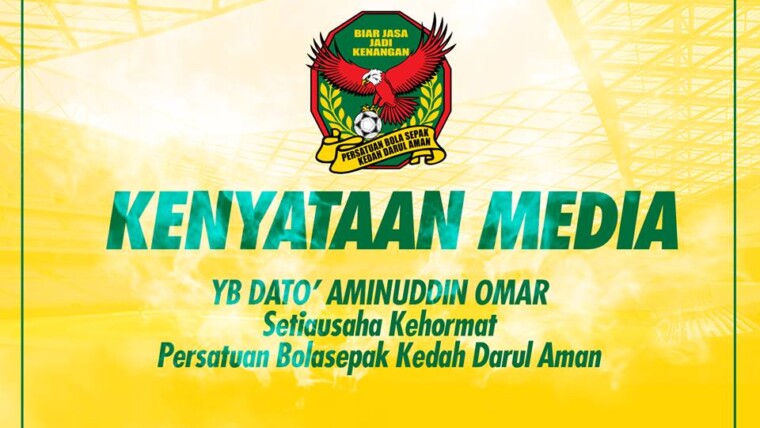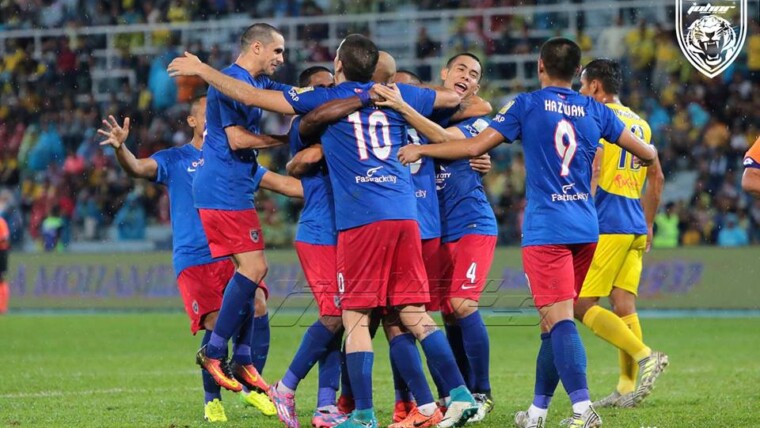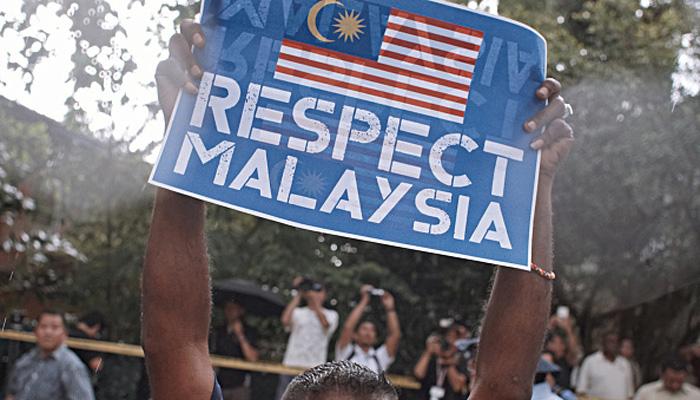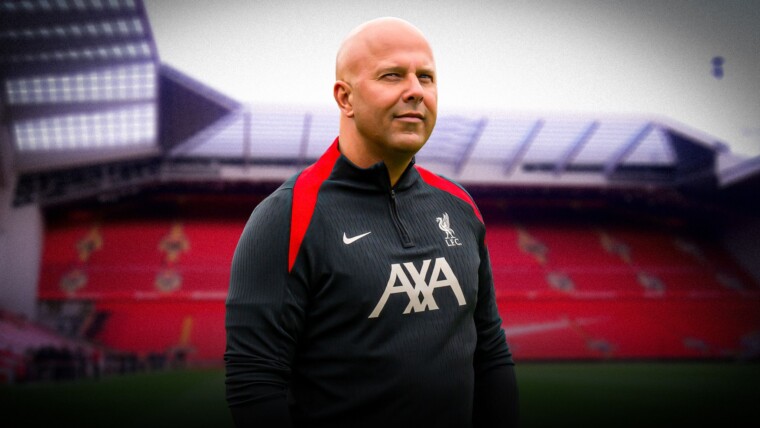As I drove into the street where Datuk M. Karathu lived in, it dawned upon me that his housing area was a perfect fit for the charisma and class that embodies the 74 year-old football coach. It was quaint, it was old-school, but it was also timeless. Seconds later, I was greeted by the usual warm smile of a man who has contributed the last five decades of his life to Malaysian football.
I’ve interviewed him on a couple of other occasions, but meeting him still gives me tiny doses of goosebumps. He has told me stories of what it was like to play in the first few Malaysia Cup tournaments, back in the 60s. He has told me stories of what it was like to deal and cope with the challenges of managing Kelantan FA during its glory days, not too long ago. But this particular interview was going to be different.
https://www.instagram.com/p/BDHquCFP7V4/?taken-by=keeshsundaresan
While he is widely known for his achievements in Malaysian football, Karathu is also one of the few Malaysian coaches to have had stints abroad. The first one happened in 1999, when he officially took over the Sri Lankan national team job for a year. Right after that, he travelled to Tajikistan for a short stint a Technical Director, before spending two years with Woodlands Wellington in Singapore. I was going to have very little time with the man, so I got right into it, as soon as we both settled down in his living room.
FO: Do you miss football Datuk?
Karathu: Professionally, I suppose. You can never take it out of me. I’m not coaching any team at the moment, but I continue to indulge myself in plenty of football every single day. It’s just who I am.
FO: What do you mean by indulge?
Karathu: I closely follow European football on television. And I still catch most of the big Malaysia Super League matches – they can be fun and exciting, you know. I’m following the ongoing Confederations Cup as well. In fact, I was up earlier this morning to watch the Portugal vs Chile match. You can always learn something new when you watch top teams play. That gets me excited!
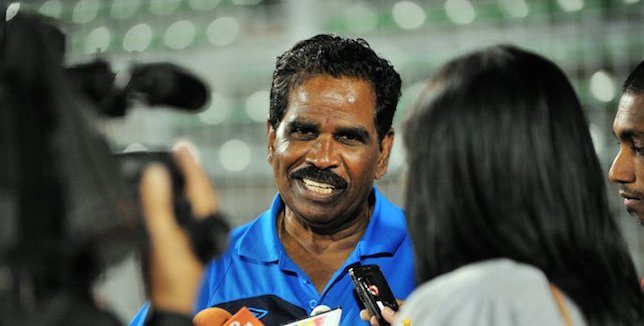
FO: You’ve been in the game so long, both as a player and as a coach. Calling it ‘long’ is an understatement – you were there since the early 60s. But how do you still get excited over football? How does one maintain that child-esque sense of excitement?
Karathu: It’s simple. I never assume or think that I have enough knowledge. No matter how long you are in football, you can never know enough. Ideas and tactics are constantly evolving. It’s the biggest problem I have with coaches here in Malaysia at times. They get too comfortable and assume they have enough knowledge to understand football in its entirety. No one wants to look outside the country and see the wide range of ideas that exists out there.
FO: Is that why you chose to go abroad and coach Sri Lanka back in 2001? To experience a football culture that was completely different?
Karathu: To a certain extent, yes. I was approached by Datuk Peter Vellapan, who was spearheading Asian Football Confederation at that point, and he told me Sri Lanka were interested in getting me on board. I was already a coaching instructor at that point, and I had gone on multiple trips abroad to train coaches. The challenge in Sri Lanka was tied closely to that. In South Asia, they were deemed as the fourth best team, behind India, Pakistan and Maldives. And so my job wasn’t only to coach the national team, it was about trying to help the country’s football system flourish. I was really attracted by that prospect.
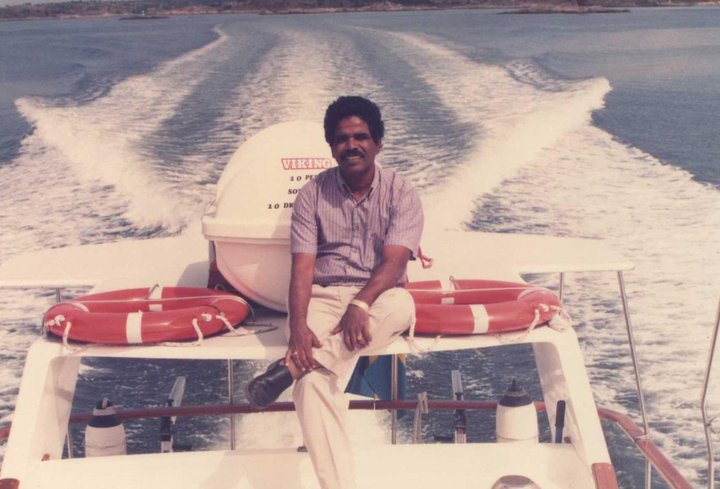
FO: But what was it like though?
Karathu: It was difficult because there was plenty of unrest in the country at that point. The Tamil Tigers were still heavily battling Sri Lankan troops and that complicated my job to a certain extent. I couldn’t call-up players of Tamil descent – all of whom were based in Jaffna at that point. They couldn’t cross over to attend selections and neither was I able to cross over into Jaffna to select them. And even in Colombo, where I was based, things could get pretty scary at times. Security was tight all the time. My wife followed me to Sri Lanka and in the first few weeks, I use to drive around. But police officers used to stop me at checkpoints and it was difficult because I didn’t speak Singhalese. Thankfully, the Sri Lankan FA president, who was also the Deputy Inspector General of Sri Lanka’s police force, eventually got me a driver. Otherwise, it will a fulfilling stint, albeit a short one.
FO: If it was going well, why did you leave after just one year?
Karathu: Sri Lankan football visibly needed time to grow and expand and I did my best to train and produce good local coaches to boost youth development in the country. But safety was always a concern at the back of my head, especially since my wife was there with me. I was often invited to dinners in big hotels, but I tried to avoid them, because these popular spots could be targeted by members of the Tamil Tigers. So after one year, my wife and I decided that moving back to Malaysia was the best decision. But don’t get me wrong, I learned a lot during my stint with Sri Lanka and I thoroughly enjoyed it.

FO: But you jumped from Sri Lanka to Tajikistan, where you were a technical director for approximately six months. That’s a huge jump, no? Sri Lanka in approximately four hours away by plane. Tajikistan is as far as the moon! What influenced that particular decision?
Karathu: You wouldn’t believe it. I had to fly from Kuala Lumpur to Moscow, before taking another flight from Moscow to Tashkent in Uzbekistan. Then I took a car ride across the border between Uzbekistan and Tajikistan, which was heavily militarised. Once I was in Tajikistan, I had to take a short 40-minute flight to the capital – Dushanbe. The process was tiring! But I had been to Tajikistan once prior to that, where I conducted a course for new coaches. About a month after that, Peter came to me and said the president of Tajikistan FA was impressed and wanted me to become their Technical Director. It was a good opportunity for me to test myself in a new environment, so I jumped at it.
FO: Sri Lanka was dealing with Tamil Tigers when you went there. On the other hand, Tajikistan was dealing with political unrest when you arrived, no? You do have a knack of picking hot spots!
Karathu: Haha maybe! Tajikistan was completely new for me. They had been independent for about 10 years when I went but anti-Russian sentiments were still prevalent. And because of political unrest, most areas were heavily militarized, including the border. When I crossed the border between Uzbekistan and Tajikistan, I really feared for my security. There were men with guns everywhere and they kept asking me for information on what I was going to do in Dushanbe. But once I explained, it was fine. In the city itself, I stayed in a hotel and was advised against going out after 10 for security reasons.

FO: How did you deal with the differences thought? Language barrier, cultural differences, food?
Karathu: Good thing is I was given an interpreter, who spoke perfect English. I can’t recall her name now, but she helped me a lot during my stay there. I can’t remember any now, but I did learn some basic Tajik words when I was there. One positive thing was the friendship I formed with India’s ambassador to Tajikistan! I’d go over to his place for Indian food every now and then, but otherwise, I coped perfectly fine with local food. It wasn’t too bad, you know!
FO: If the food was good, what made you leave after six months? Haha jokes aside, what fueled your decision to leave?
Karathu: Tajikistan was a fresh project. There were barely any plans in place over there, so I had to go and help them build a strong base. I’d like to think I did a decent job, but there was too much of politics at play there. So it was difficult to push and implement large scale plans and policies. At the same time, Perak had just sacked Karl-Heinz Weigang at that point, and they needed a coach for the Malaysia Cup. They got in touch with me and it was a project that caught my attention. So that played some part in my decision to leave Dushanbe.
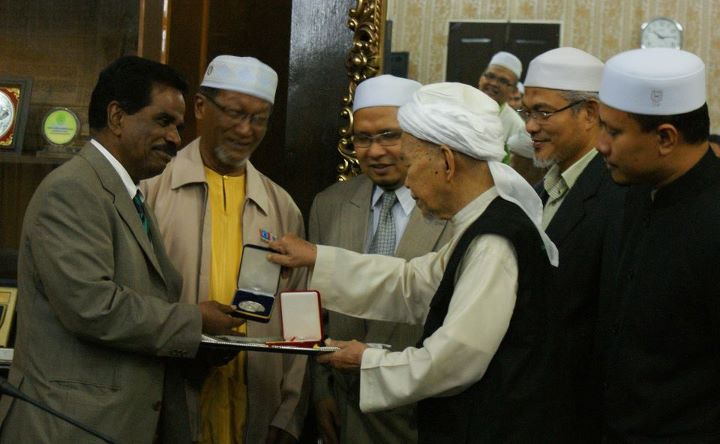
FO: Some of these things you’ve said today is absolutely incredible. But few Malaysian coaches can say similar things. Why do you think Malaysian coaches are not too fond of going abroad?
Karathu: I think the reasons are pretty mixed. On one hand, I think our local coaches don’t have a good grasp of the English language. It sounds simple, but it’s such an important thing if you have aspirations of coaching abroad. But you can’t blame the coaches only. The stature of Malaysian football means that it’s always difficult for our coaches to market themselves abroad. I was lucky to have landed those opportunities. It’s a lot easier if you come from England, Spain or Brazil. These are huge footballing nations, and I’ve seen coaches with very little understanding of the game, get appointed by virtue of being from Europe or South America.
FO: But surely some of these foreign coaches have some form of pedigree?
Karathu: True. But a lot of them are also average. It’s a matter of perception. Look at the Malaysia Premier League last year. Top two teams were Melaka United and PKNS FC and both teams were coached by locals. In the Malaysia Super League, barring JDT, who have most of the country’s best players, the other three teams in the top four were all coached by locals. The quality is there, but at the end of the day, it’s all about perception. Over here, decisions are made by individuals who don’t quite understand football. They think ‘if I hire a foreign coach, it would create hype around the team’. But none of this benefits the team, if the coach is not good enough or doesn’t understand what it takes to succeed in Malaysia.
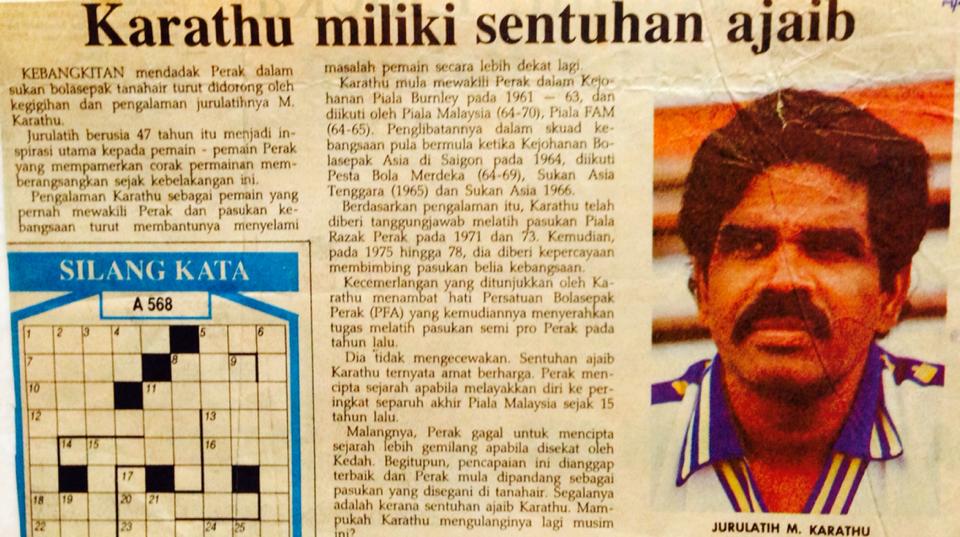
FO: How do we change this perception though? How do we inculcate a culture that prioritizes quality?
Karathu: I really don’t know. It’s such a tricky situation and it’s not easy. On one hand, you’ve got match-fixing, on the other hand you’ve got agents and foreign talents, be it players or coaches, looking to make money. Then you also have corrupted individuals in football associations. It’s all connected. So how do you stop it? How do you educate people to stay true to the values of football? It’s difficult.
FO: And yet you still love football?
Karathu: There’s so much more to it and it’s a strong part of my blood and DNA. I’ve lived and breathed the game all my life.
FO: One final question. You’ve been away from professional football for a while now. Are you officially retired? Or will we see you back in football soon?
Karathu: Haha I’m always open to opportunities. But I’m at a stage where I will only accept and consider offers that are good. When I say good, I mean being able to make decisions regarding the team, without any interference. It’s difficult when you are not given the freedom to make decisions. But I still keep myself involved with football via open football clinics or charity football programs. And I’m happy for the time being. But you can never say never, if the right opportunity comes along.
What are your thoughts on Datuk M. Karathu’s story? Let us know by commenting below!
Other posts by Keeshaanan Sundaresan


